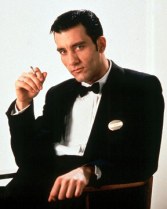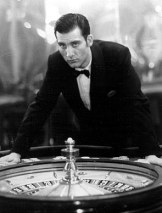| Croupier |
| |
 |
UK, 1998. Not rated. 91 minutes.
Cast: Clive Owen, Gina McKee, Alex
Kingston, Kate Hardie, Nicholas Ball, Nick Reding, Kate Fenwick
Writer: Paul Mayersberg
Music: Simon Fisher-Turner
Cinematographer: Michael Garfath
Producers: Jonathan Cavendish, Christine Ruppert
Directors: Mike Hodges
LINKS
|
| Grade: B |
Review by Carlo
Cavagna |
 hink
of Croupier as an alternate and superior British version of Rounders
with elements of Reindeer Games thrown in. Like Rounders, Croupier
concerns a man living a straight life (as an unsuccessful novelist in this case)
who, against the wishes of his girlfriend and his own better judgement, returns
to the seamy world of gambling. In Croupier, the protagonist is on the
other side of the table. He is the dealer, not the gambler. Being the dealer
proves to be no less treacherous. Like the successful gambler, the dealer must
be able to read other people. Like the gambler, he must wear two faces, an impassive
exterior to disguise the thoughts within. Like the gambler, he must resist the
temptations of illegal money-making schemes.
hink
of Croupier as an alternate and superior British version of Rounders
with elements of Reindeer Games thrown in. Like Rounders, Croupier
concerns a man living a straight life (as an unsuccessful novelist in this case)
who, against the wishes of his girlfriend and his own better judgement, returns
to the seamy world of gambling. In Croupier, the protagonist is on the
other side of the table. He is the dealer, not the gambler. Being the dealer
proves to be no less treacherous. Like the successful gambler, the dealer must
be able to read other people. Like the gambler, he must wear two faces, an impassive
exterior to disguise the thoughts within. Like the gambler, he must resist the
temptations of illegal money-making schemes.
Although highly stylish and original, Croupier falls short of excellence.
One problem is the presence of hilariously unnecessary voiceover narration,
during which the protagonist, Jack (Clive Owen), shows his mastery of the obvious
by persistently pointing out things we can plainly see for ourselves, referring
to himself in the third person in an ironic tone of voice all the while.
(From the high grade and the encouraging opening paragraph, Jack observed
that the reviewer had enjoyed the film. This was good news. It seemed, however,
that the reviewer was less than pleased with the narration...)
Jack starts on a novel based on his experiences as a "croupier" (term of art
for a dealer in a casino, apparently), and the narration represents Jack writing
the novel as the real story unfolds. His ironic detachment conveys the sense
of control experienced by the expressionless croupier, a people watcher extraordinaire.
With experience a croupier learns to observe all the little things conveyed
by the customers' gestures and manner, eventually divining their thoughts and
seeing right through them.
(...As he reached the end of the third paragraph, Jack could see the reviewer
had not fully understood the purpose of the narration. Although the reviewer
did appear to grasp something of what it means to be a croupier, only a real
croupier could fully understand...)
Unlike the narration in Fight
Club, Goodfellas,
and Trainspotting,
the voiceover in Croupier is not an artistic end unto itself. It's a
screenwriter's crutch. It doesn't twist or augment what's happening onscreen,
it just explains it. Guiding us through Jack's return to the world of gambling
and casinos, it attempts to compensate for sloppy exposition. We never really
get to know the straight-arrow Jack as he's supposed to be at the beginning
of the story, so the narration tells us how Jack changes, making sure we understand.
(...The fourth paragraph confirmed that the reviewer didn't know what he
was talking about. Jack had seen this before. Jack could read between the lines.
The reviewer's attempt at knowledgeable criticism was intended to disguise the
fact that he could not read the film as Jack could read him...)
Croupier is an engrossing journey despite the narration. As Jack gradually
detaches from the world around him, he sees people more as numbers and probabilities
than as human beings, and he becomes mildly perverse... simply because he has
the power to be so. There is an interesting and sometimes funny juxtaposition
of how full of integrity everyone thinks Jack is–including Jack himself–with
what's actually occurring in the story.
(...By the end of the fifth paragraph, Jack had–Okay, okay, shut up
already. This was annoying enough in the film; I won't stand for it in my review!
...You, sir, have no sense of art... This isn't art; this is a review.
Go away.)
Croupier adds layer upon layer of complexity to the story as it progresses,
sort of like peeling an onion in reverse. However, characters' motivations are
murky. For example Jack is hired to do a job that it is not necessary to hire
him to do, because he would have done it anyway. As the protagonist's girlfriend,
Gina McKee (Notting Hill) makes a more sympathetic character than her
counterpart Gretchen Mol in Rounders, but it's unclear (and inconsistent
with her character) why she stays with Jack as he grows distant and gets involved
with other women, Bella (Kate Hardie), a fellow croupier, and Jani (Alex Kingston),
a customer.
AboutFilm.Com
The Big Picture
|
| Alison |
-
|
| Carlo |
B
|
| Dana |
B
|
| Glenn |
B+
|
| Jeff |
B
|
| Kris |
B
|
Because Croupier is so absorbing, it is disappointing that plot threads
are left hanging at the end. With all the narration, it's amazing what isn't
cleared up, and the ending raises as many questions as it answers. Things happen
to characters around Jack–convenient things that facilitate his transformation
into the ultimate control artist, but for which there are no good explanations.
Of course, he's not really in full control. Something unexpected happens near
the end that Jack may or may not be responsible for. This kind of ambiguity
is often intriguing, but in Croupier, it's frustrating and virtually
pointless. It doesn't help that during the scene, a character appears almost
for the first time, says bizarre things, and is never seen again. Mike Hodges'
coolly assured direction (Hodges also directed the classic British thriller
Get Carter) does counterbalance the confusion somewhat.
Other AboutFilm.Com contributors have suggested there is a way of interpreting
Croupier that helps everything to make sense, which is that the narration
represents not only the novel being written as Jack lives his life, but that
the novel encroaches on reality. In other words, Croupier begins in the
real world and ends in fantasy as Jack's delusions take over. If this possibility
were more fully developed, the mixing of reality and fiction would add a fascinating
dimension to the film and partly explain the more unusual events and unresolved
elements, as well as the seemingly unnecessary narration. Unfortunately, there
is little evidence upon which to base that interpretation–only that the narration
hints that Jack exercises more control over people and events than seems possible.
Control that would not be possible, that is, unless Jack himself is the author
of the world around him. To determine whether such an interpretation could be
valid would require a second viewing, but, though engaging, Croupier
is not quite good enough to merit one.
Review
© July 2000 by AboutFilm.Com and the author.
Images ™ and © The Shooting Gallery, Inc. All
Rights Reserved.


